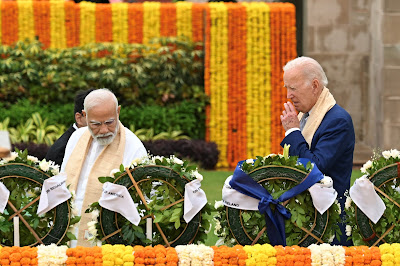Trudeau's Khalistan Gamble: A Diplomatic Live Wire
In just a matter of 15 days, Justin Trudeau's public accusation of India’s role in the murder of Hardeep Singh Nijjar, a Sikh separatist leader, has impacted international relations between Western nations and India. Trudeau's accusation has had far-reaching effects on global diplomatic relations. Trudeau's claims lack concrete evidence, leading to skepticism and concerns about political motivations. What's remarkable among these claims is that U.S. President Joe Biden was reportedly aware of Nijjar's murder during prior to his visit to India.
 |
| Flags and signs are seen as demonstrators protest outside India's consulate, in Vancouver, British Columbia, Canada. REUTERS/Jennifer Gauthier |
Canadian intel on the Sikh separatist’s assassination were among the discussion between Joe Biden and PM Narendra Modi. This awareness adds another layer of complexity to the situation, implying that the U.S. had insights into the matter for a very long time. Intel on Nijjar's murder was shared through Joe Biden's private discussion with PM Narendra Modi during the 18th G20 summit. This very fact stresses the diplomatic position that America finds itself in while trying to balance relations between Canada and India. A challenging aspect is gaining momentum, underscoring the importance of handling international matters carefully, especially when such serious allegations are involved. Canada is the undeniable next door neighbour of the US, but Nijjar’s links with anti-India and extremists acts cannot be negated.
India recognizes that the relationship between the U.S. and Canada will endure. However, India holds a crucial role as a defense partner for the U.S., particularly in the Indo-Pacific region, where both nations share a common challenge, China. The challenging situation in Nijjar’s murder and his past activities, forces Washington to walk a fine line. While expressing deep concern over Trudeau's allegations, U.S. is careful not to provoke India. The Biden admin emphasizes its relationship with India for stability in the Indo-Pacific region. The U.S. National Security Council have also acknowledged the balancing act it must perform.
This very stance draws parallel to the previous
actions taken by the U.S. and its allies in response to international crises. In
the case of the poisoning of a Russian spy in Britain, the U.S., along with
European nations, expelled Russian diplomats in a coordinated effort to support
the United Kingdom. Similarly, in the aftermath of Jamal Khashoggi's murder in
the Istanbul, the U.S. introduced the "Khashoggi Ban," imposing visa
restrictions on individuals involved in countering dissidents on behalf of
foreign governments. America will look to avoid risk its relationship
with India for the death of Nijjar, a man who was already branded as a wanted
terrorist in India. Nijjar's status as a wanted terrorist in India adds complication
to the matter, and the U.S. aims to prevent any unintended strain on its key
ally in the Indo-Pacific region. The United States is aware of Canada has
failed to extradite designated terrorists to India and has not adhered to
anti-India Khalistani slogans. But, Trudeau's refusal to share Canada's evidence complicates the U.S. role in the matter.
Jake Sullivan, the U.S. National Security Adviser, stresses
the importance of facts and holding offenders responsible. The U.S. National Security Council have highlighted
the sheer unacceptability of targeting dissidents in foreign nations but it has
laid emphasis on parallel ties with New Delhi. While India labelled Trudeau's allegations as
"absurd" and warned of growing "anti-India activities" in
Canada, the situation remains highly sensitive. The U.S. is delving into the
details and if credible evidence emerges of the Indian government's
involvement, it could lead to conversations that are uncomfortable. It can potentially
impact the positive momentum in the Indo-US relations.
This development also poses a risk to India's international reputation in the West. Depending on the outcome of Canada's investigation, these allegations will present a challenge to India's image on the global stage.





Comments
Post a Comment